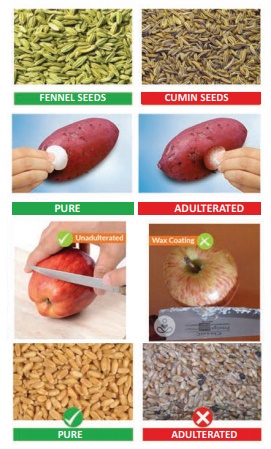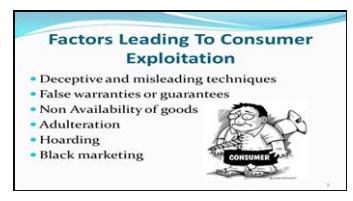Consumerism | Consumer Protection - Consumer Exploitation | 12th Commerce : Chapter 16 : Consumer Protection : Consumerism
Chapter: 12th Commerce : Chapter 16 : Consumer Protection : Consumerism
Consumer Exploitation
Consumer Exploitation
Some of the ways in which consumers are being
exploited are enumerated hereunder:
1. Selling at Higher Price
The price charged by the seller for a product
service may not be commensurate with the quality but at times it is more than
the fair price. Even though sellers have surplus or adequate goods they create
artificial scarcity in the market with an intent to push up the prices. As a
result, consumers are forced to buy the short supply of goods at higher prices
in the black market.
2. Adulteration
It refers to mixing or substituting undesirable
material in food. This causes heavy loss to the consumers. This will lead to
monitory loss and spoil the health. But adulterators make illegitimate profit
while prudent businessmen aim at normal profit whenever unscrupulous traders
seek to reap higher profit out of greed, they seek to adulterate the products.
Adulteration is quite common in food articles. It is a crime which cannot be
pardoned as it spoils the very health of consumers.

Example:
1. Chemicals, detergent chalk, urea caustic soda,
etc. are added to make the milk dense and white.
2. Mixing of stones with grains
3. Mixing of coconut oil with palmolein
4. Honey is adulterated with water and table sugar
to enhance the quantity
5. powdered rice/wheat is adulterated with starch
6. Coffee powder is adulterated with tamarind seed
7. Spices like turmeric powder is adulterated with
methanol
8. Papayas seed is added to black pepper
9. Chilli powder is adulterated with brick powder

3. Duplicate or Spurious goods
Duplicate products of popular products are
illegally produced and sold. Duplicates are available in plenty in the market
for every original and genuine parts or components like automobile spare parts,
blades, pens, watches, radios, medicines, jewellery, clothes and even for
currency notes. Duplicate medicines are sold in large measure, from Cape to
Kashmir. A consumer is not in a position to distinguish duplicate from the
original.
4. Artificial Scarcity
There are certain situations where the shop-keepers
put up the board ‘No Stock” in front of their shops, even though there is
plenty of stock in the store. In such situations consumers who are desperate to
buy such goods have to pay hefty price to buy those goods and thus earning more
profit unconscientiously. Even in Cinema houses, board may hang in the main
entrance ‘House Full’ while cinema tickets will be freely available at a higher
price in the black market.
5. Sub-standard
On opening a packet or sealed container one may
find the content to be of poor quality. If defective or damaged items are found
in a pack, a consumer finds it difficult to exchange the defective one for good
one and consumers have to blame for lack of attention one cannot return it and
the consumers have tendency to blame their carelessness or fate for having
bought such sub-standard product. Whenever goods are bought, seller try to
avoid raising bill or consumers do not demand bill as a matter of right. This
prevents the consumers from escalating the complaint against the seller where
the product happens to be sub-standard. Some seller give bills which contain a
stipulation that goods sold cannot be taken back. Thus gullible consumers are
easily and legally cheated.
6. Product Risk
Whenever the usage of goods is likely to cause
danger or hurts to customers, manufactures have to forewarn the consumers of
various sources of dangers involved in the products and the precautionary
measures to be taken by the consumers. In absence of such information or
warnings consumers are more likely to encounter risks while using the risky
products.
7. Warranty and Services
In case of consumer durable goods like televisions,
washing machines, refrigerators, cars, two wheelers and air conditioners etc.
free service is guaranteed only for few years called warranty period. But in
reality free service are denied on flimsy grounds even during the warranty
period. Customer care service is likely to be rendered the shorter warranty
period only for select few items which the manufacturers know pretty well that
they do not get damaged during such period .Warranty service may not be
extended to many parts/components of the product sold. Thus consumers may be
charged exorbitant charges in the name of repair costs.
8. Unsuitability of Products
The product quality, durability and suitability may
come under the category of product fitness. What is claimed by the product
advertiser must correspond to the products sold. But in actual practice, it is
not so. Items unsuitable for human consumption are sold in the market. Some
items marked as “unbreakable’’ break while using them. Battery having a label
‘leak proof’’ is more likely to leak. In all these eventualities
users/consumers have to bear the consequences while producers/ manufacturers
escape utilising the loopholes in the legal system.
9. False Advertisements
The main purpose of advertisement is to educate the
consuming public and customers of various aspects of the products/service. In
reality, advertisements convey very little information about the product. Many
times it makes false representation about the quality, price, grade,
composition, utility guaranteed, performance etc. Consumers who buy the
products on the faith of claims made in advertisements are cheated.
Thus consumerism has emerged and evolved out of
outcome of sufferings and exploitation of consumers, whose sole aim is to
secure protection from commercial terrorism and exploitative practices and
thereby safeguarding their interest by establishing the rights and powers
against producers and sellers.
Related Topics